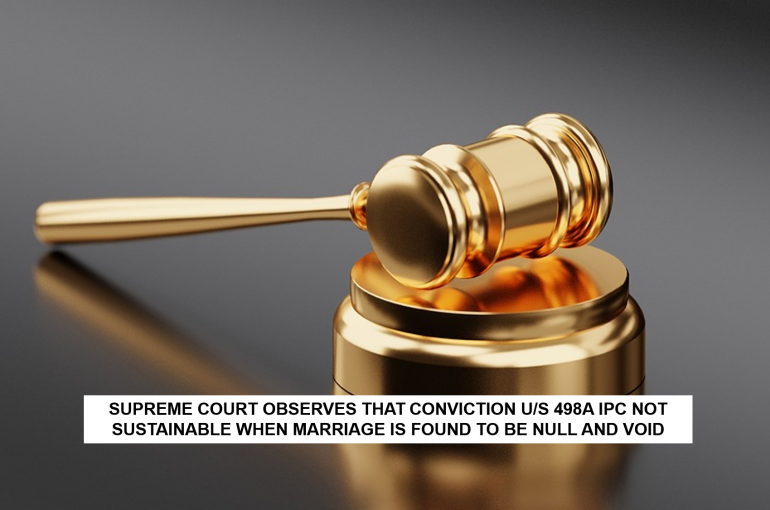SUPREME COURT OBSERVES THAT CONVICTION U/S 498A IPC NOT SUSTAINABLE WHEN MARRIAGE IS FOUND TO BE NULL AND VOID
Recently, a two Judge Bench of the Supreme Court (Court) comprising of Justice B.R. Gavai and Justice Vikram Nath passed a Judgment dated 17.02.2023 in Ananta Chandrakant Bhonsule (D) By Lrs. And Anr. v. Trivikram Atmaram Korjuenkar (D) By Lrd. And Anr. in Criminal Appeal Nos.1404-1405 OF 2012, and has observed that section 498-A (Husband or relative of husband of a woman subjecting her to cruelty) of the Indian Penal Code, 1860 (IPC) would be applicable if the marriage is enforceable by law.
FACTS
The Appellant No.1, P. Sivakumar had married Beula on 04.12.2003. Soon after marriage, disputes arose between the Parties and they started residing separately. After some time, the wife filed a complaint before the Deputy Superintendent of Police, Kanyakumari, Tamil Nadu. After investigation, the charge sheet came to be filed for the offences punishable under Section 498-A IPC and Sections 3 (Penalty for giving or taking dowry) and 4 (Penalty for demanding dowry) of the Dowry Prohibition Act, 1961 against the four Accused, namely, Accused No.1-Husband, Accused No.2- Mother-In-Law, Accused No.3-Father in Law and Accused No.4-Brother-in-Law. The trial was conducted before the Learned Judicial Magistrate, Nagarcoli, Kanyakumari District, Tamil Nadu. On the conclusion of the trial, the Learned Trial Judge acquitted all the Accused persons of all the offences charged with.
Being aggrieved by the Order of the Trial Court, the State filed an Appeal and Wife also filed a Revision Petition before the Madras High Court. The Appeal was partly allowed vide Order dated 07.12.2011. By the Impugned Judgment and Order, the Acquittal of Accused Nos. 1 to 3 was set aside and they were convicted for the offences punishable under Section 498-A IPC and Sections 3 and 4 of the Dowry Prohibition Act.
Aggrieved by the Impugned Order of the Madras High Court, the Accused filed a Criminal Appeal before the Supreme Court under Article 136 of the Constitution of India. (Criminal Appeal to the Supreme Court.
REASONING AND ANALYSIS
At the Supreme Court, it was contended that, as the marriage between the parties has been held to be null and void by the Judgment of the High Court of Madras, the conviction under Section 498-A IPC cannot be sustainable and reliance was placed on the earlier decision of the Supreme Court in Shivcharan Lal Verma v. State of Madhya Pradesh (2007) 15 SCC 369.
In the present case, the Supreme Court observed that:
“Undisputedly, the marriage between the Appellant No.1 and PW-1 has been found to be null and void. As such the conviction under Section 498-A IPC would not be sustainable in view of the judgment of this Court in the case Shivcharan Lal Verma’s case supra.”
Regarding the conviction under Sections 3 and 4 of the Dowry Prohibition Act, the Apex Court noted that the Trial Judge by an elaborate reasoning and after appreciation of evidence, has found that the prosecution has failed to prove the case beyond reasonable doubt. The Court further observed that
“In an appeal/revision, the High Court could have set aside the Order of acquittal only if the findings as recorded by the trial Court were perverse or impossible. We do not notice any perversity in the approach adopted by the learned trial Judge. The view taken by the trial Court also cannot be said to be impossible.”
CONCLUSION
Thus, based on the aforesaid observations, the Apex Court allowed the Appeal and Judgment dated 07.12.2011 of the Madras High Court was quashed and set aside and the Judgment of the Trial Court is affirmed. Therefore, allowing the Appeal, the Bench acquitted the Appellants.
Devashish Kakkar
Legal Associate
The Indian Lawyer





































Leave a Reply